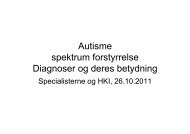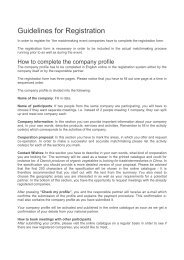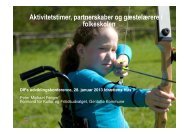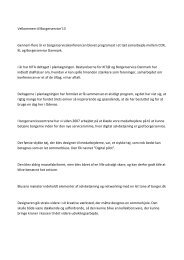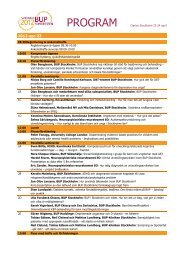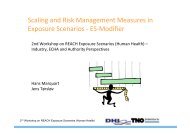Clusters are individuals - VDI/VDE-IT
Clusters are individuals - VDI/VDE-IT
Clusters are individuals - VDI/VDE-IT
Create successful ePaper yourself
Turn your PDF publications into a flip-book with our unique Google optimized e-Paper software.
grams Competence Networks Germany, Norwegian Centres<br />
of Expertise, ARENA and Vinnväxt. The study confirmed that<br />
international activities of cluster managements translate in<br />
an increased international visibility of the clusters. The study<br />
also highlights that good cluster management can overcome<br />
the barriers of internationalization (e.g. lack of financing<br />
or capacity); particularly, if an internationalization strategy<br />
exists for the cluster and is implemented by the cluster management.<br />
By being guided through an internationalization<br />
strategy cluster managers <strong>are</strong> able to implement successful<br />
activities for the cluster members. In turn this increases the<br />
willingness of companies and other stakeholders such as<br />
research institutions or government bodies to engage financially<br />
in international cluster activities. The development<br />
of international competences of cluster managements and<br />
members of the cluster is therefore an important task that<br />
should be at the heart of cluster programs if they want to<br />
support the internationalization of their clusters. There is a<br />
wide set of instruments available, but it is not the financial<br />
assistance for projects that matters in the first place, but<br />
rather the availability of technical assistance, e.g. in the form<br />
of workshops and trainings to support strategy development<br />
and competencies such as language or cross-cultural<br />
competencies.<br />
The successful internationalization of clusters does not depend<br />
only on a professional and capable cluster management<br />
and on support from cluster programs. The legal framework<br />
of a country, both the home country of the cluster<br />
and its “target country”, may also create barriers for internationalization.<br />
This applies in particular to <strong>are</strong>as such as tax<br />
legislation, labor law, immigration law and company law.<br />
Administrative burdens, e.g. in the case of the registration of<br />
a company, <strong>are</strong> also often barriers that <strong>are</strong> frequently mentioned<br />
by cluster managers.<br />
3.3.5 PROGRAM OWNERS TAKE OVER A MORE ACTIVE ROLE<br />
TOWARDS DEVELOPING INDIVIDUAL CLUSTERS<br />
The majority of the interviewed program owners confirmed<br />
that individual professional support of cluster managements<br />
through tailor-made services has gained more importance in<br />
recent years. Many program owners were - as a key element<br />
of their strategic approach to cluster development - from<br />
the very beginning of the program pro-active in terms of<br />
dialogue with clusters, specific criteria for support, provision<br />
of best practice and expert consulting. This includes in particular<br />
the Swedish programs Vinnväxt and Tillväxtverket, the<br />
Norwegian programs Norwegian Centres of Expertise and<br />
ARENA, the German Initiative Competence Networks and<br />
the Polish cluster support scheme. In the case of the other<br />
programs program owners were also aw<strong>are</strong> of the need of<br />
pro-active involvement, but did not put that much emphasize<br />
on it because it did not feature that high in terms of the<br />
strategy of the program. However, these program owners<br />
have become more actively involved in individual cluster development<br />
in the recent past respectively they plan to do so.<br />
There was no program owner who argued that there is no<br />
need for an active role in the development of individual clusters,<br />
but some argued that more attention should be paid<br />
to this in the context of future program and policy strategies.<br />
The different programs have different sets of instruments<br />
available to influence the development of individual clusters:<br />
• Regular meetings with clusters (both joint meetings with<br />
all clusters and bilateral meetings between clusters and<br />
program owners) and workshops <strong>are</strong> instruments that <strong>are</strong><br />
frequently used by most program owners (e.g. Vinnväxt,<br />
the Regional Cluster Program of Tillväxtverket, Norwegian<br />
Centres of Expertise and ARENA, Cluster Offensive Bayern,<br />
Competence Networks Germany and Innovation Networks<br />
Denmark).<br />
• In addition to these instruments the Norwegian programs<br />
NCE and ARENA also offer specific toolboxes for cluster managers<br />
in order to support cluster development. In the context<br />
of the Innovation Network Denmark program NETMATCH is<br />
currently developing similar toolboxes for cluster managers.<br />
• Prior to the NGPExcellence cluster benchmarking project<br />
benchmarking of clusters to facilitate cluster development<br />
has been used by only two programs: the Polish cluster support<br />
scheme and Competence Networks Germany.<br />
• Competence Networks Germany also offers a wide array<br />
of different working groups and seminars for cluster managers.<br />
They cover topics such as sustainable financing,<br />
innovation management, quality management, IPR, internationalization,<br />
communication and services. In this regard<br />
the program Competence Networks Germany is out of the<br />
ordinary comp<strong>are</strong>d to other cluster programs as it does not<br />
provide funding to cluster managements, but only tailormade<br />
services to facilitate individual cluster development.<br />
With the establishment of NETMATCH in 2010 the program<br />
Innovation Networks Denmark has set up a similar support<br />
organization. In France the association “France <strong>Clusters</strong>”<br />
offers similar services to clusters that <strong>are</strong> supported through<br />
the Grappe d’enterprises program, but the services <strong>are</strong> also<br />
available to other clusters.<br />
Several program owners highlighted that cluster managers<br />
have to trust the program owners, otherwise the chances of<br />
having an influence on the development of individual clusters<br />
<strong>are</strong> limited. Cluster managers have to consider program<br />
owners as partners for development and vice versa. The<br />
transp<strong>are</strong>nt offer of services and the transp<strong>are</strong>nt implementation<br />
of instruments <strong>are</strong> important for trust building.<br />
51




